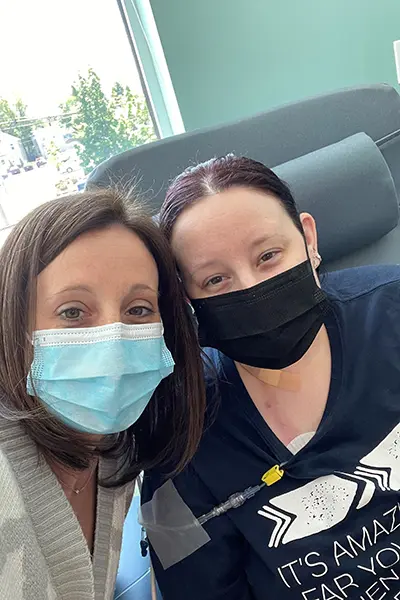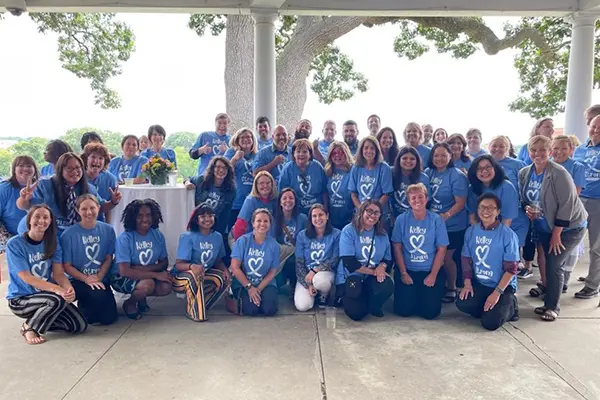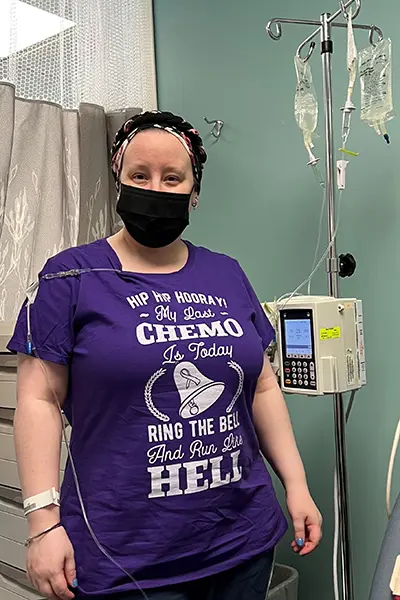 Image by K. Webster
Image by K. Webster
Kelley Lawson has no sign of disease a year after finishing treatment for Stage 4 cancer.
In 2024, a year after undergoing chemotherapy and extensive surgery for Stage 4 colorectal cancer that had spread to her liver, Kelley Lawson is grateful for a second chance and a fresh start.
The assistant director of student success and communications for the Honors College says that on the one-year anniversary of her November 2022 surgery, her oncologist found no evidence of disease.
Lawson still faces some health challenges, and her cancer won’t be considered “in remission” until she is disease-free for five years.
But she tries to focus on the positive. She is slowly rebuilding her life and health on a platform of gratitude for her friends and family, self-care, and the purpose and joy she finds in her work at UMass Lowell.
Faculty, staff and students return the appreciation.
“If I had to find one word to describe Kelley holistically, it'd be ‘dedicated,’” says Amel Popovac, a junior applied biomedical sciences major who has been mentored by Lawson.
“She goes above and beyond in her caring for students. She treats us like family,” he says.
Director of College-Based Advising Justin Gerstenfield, who worked with Lawson for several years in professional and college-based advising, is a big fan, too. He says students “absolutely love” Lawson – and that she was incredibly supportive after Gerstenfield was diagnosed with cancer in 2020, organizing a group of co-workers to post upbeat signs along his driveway before his first oncology appointment.
“She’s one of those good humans that you want around for students and for yourself,” Gerstenfield says. “She does anything to help students achieve, but not in a hand-holding way. She holds them accountable, but in a way that keeps them coming back.”
For this new year, Lawson has some tips for others on how to survive – and thrive – through difficult times.
No. 1: Lean on Your Supporters – and Focus on the Future

Lawson's sister accompanied her to nearly every chemotherapy session before and after surgery.
That allowed her to focus on her goal of a cancer-free future during the worst effects of chemotherapy, including a blood clot in her lung, hair loss, a syndrome that made it hard for her to eat, and nerve damage that continues to affect her hands and feet.
Her father took care of her house, while her sister accompanied her to most of her chemotherapy sessions. A close circle of friends started a GoFundMe campaign to help with her out-of-pocket medical costs.
“I felt very uncomfortable about accepting money to begin with, but it took a huge burden off of me,” she says.
And everyone whose lives she had touched at UMass Lowell rallied around her. Gerstenfield and Lawson’s other advising co-workers all donned “Kelley Strong” T-shirts on the day of her surgery, then sent her photos during the week she spent in the hospital.
The student peer leaders and team leaders whom Lawson mentored in the River Hawk Scholars Academy (RHSA), including Popovac, also showed compassion and understanding with a maturity that continues to amaze her, she says.
“I felt bad because I wasn’t as present as I wanted to be” in fall 2022, she says. “But they were great. They just filled my cup.”
 Image by Courtesy
Image by Courtesy
Staff from Advising, Academic Services and the Provost's Office wore "Kelley Strong" T-shirts the day of Lawson's surgery.
No. 2: Find Joy and Purpose in Your Work
Except for that week in the hospital and two more weeks recovering from surgery at home, Lawson kept working.
“I truly love working with students,” she says.
Even during her medical leave, Lawson kept going to a UML certificate course in supervisory leadership development. She had signed up for the once-a-year class before her cancer diagnosis, and she didn’t want to postpone it.
“I was really looking forward to it,” she says. “And it was motivating because I thought to myself, ‘I’m not always going to have cancer. I’m going to fight it and I’m going to beat it, and I’m going to have a career, and I want to keep progressing.’”
No sooner had she earned her supervisory certificate than the position in the Honors College opened up in January 2023. Now, she not only advises 700 first-year honors students in engineering, nursing and business, but she also supervises the college’s part-time advising staff and student workers like Popovac.
Honors College Dean Jenifer Whitten-Woodring and the other staff welcomed and supported her, she says, even though she had to continue working at home during the first months of 2023.
“The biggest struggle is after the cancer treatment. You’re going every other week, and then suddenly you just stop,” she says. “It’s a very lonely time, and you’re still not feeling great. But I felt like I was part of the community right away here in the Honors College.
“I truly feel this is where I’m meant to be.”
Recently, Lawson also resumed her second job as a freelance executive function coach, helping high school and college students who have ADHD or autism spectrum disorder – or who just feel overwhelmed.
No. 3: Share Your Struggles – and Pay It Forward
 Image by Courtesy
Image by Courtesy
Lawson on her last day of chemotherapy at Southern New Hampshire Medical Center.
Those are a legacy of her childhood, when her mother was often sick or in the hospital because of a serious genetic disease, she says. Her mother has since died.
“I was very, very close to my mom,” Lawson says. “My panic attacks came from, ‘If she was sick, would I be able to help her?’”
Lawson took advantage of therapy while in graduate school at Rivier College, where she earned degrees in human development and higher education. She also developed a daily meditation practice.
Now, Lawson feels less helpless – and more able to help others. In 2022, she took a class through UML, Mental Health First Aid, and in 2023, she earned certification as an Adult Mental Health First Aid instructor, one of several who lead monthly trainings for UML faculty, staff and students.
“I think mental health is just as important as students’ academic work and physical health,” Lawson says. “You have to get your needs met before you can flourish in the academic world.”
Lawson also talks openly about being put on academic probation after her first semester of college at Framingham State University, when she struggled to adjust to being away from her family, especially her mom.
That’s why she advises first-year honors students and starts programs that help them find community and a campus “home,” including Honors After Hours, when student workers keep Allen House staffed in the evenings so that other honors students can study, relax and meet with friends.
Lawson, who also volunteers for an organization that helps foster children, says that her search for and belief in a higher purpose sustained her through the worst of her suffering.
“I feel like I had to experience these things so I could relate to others and try to help them," she says.


